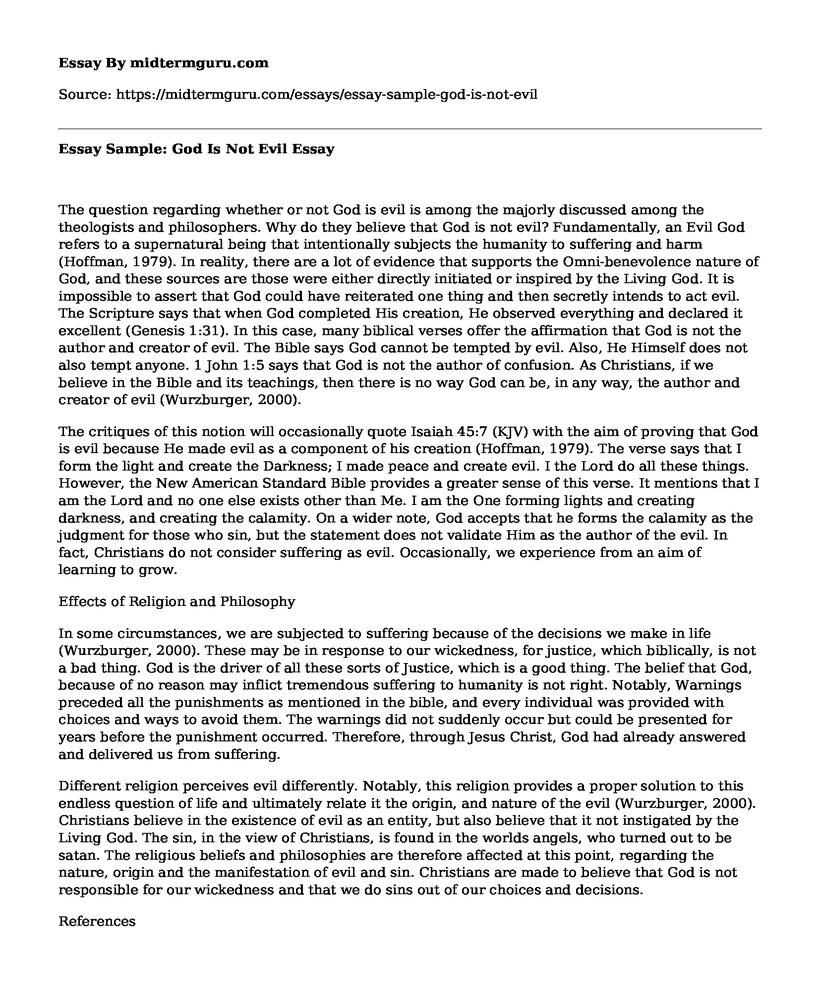The question regarding whether or not God is evil is among the majorly discussed among the theologists and philosophers. Why do they believe that God is not evil? Fundamentally, an Evil God refers to a supernatural being that intentionally subjects the humanity to suffering and harm (Hoffman, 1979). In reality, there are a lot of evidence that supports the Omni-benevolence nature of God, and these sources are those were either directly initiated or inspired by the Living God. It is impossible to assert that God could have reiterated one thing and then secretly intends to act evil. The Scripture says that when God completed His creation, He observed everything and declared it excellent (Genesis 1:31). In this case, many biblical verses offer the affirmation that God is not the author and creator of evil. The Bible says God cannot be tempted by evil. Also, He Himself does not also tempt anyone. 1 John 1:5 says that God is not the author of confusion. As Christians, if we believe in the Bible and its teachings, then there is no way God can be, in any way, the author and creator of evil (Wurzburger, 2000).
The critiques of this notion will occasionally quote Isaiah 45:7 (KJV) with the aim of proving that God is evil because He made evil as a component of his creation (Hoffman, 1979). The verse says that I form the light and create the Darkness; I made peace and create evil. I the Lord do all these things. However, the New American Standard Bible provides a greater sense of this verse. It mentions that I am the Lord and no one else exists other than Me. I am the One forming lights and creating darkness, and creating the calamity. On a wider note, God accepts that he forms the calamity as the judgment for those who sin, but the statement does not validate Him as the author of the evil. In fact, Christians do not consider suffering as evil. Occasionally, we experience from an aim of learning to grow.
Effects of Religion and Philosophy
In some circumstances, we are subjected to suffering because of the decisions we make in life (Wurzburger, 2000). These may be in response to our wickedness, for justice, which biblically, is not a bad thing. God is the driver of all these sorts of Justice, which is a good thing. The belief that God, because of no reason may inflict tremendous suffering to humanity is not right. Notably, Warnings preceded all the punishments as mentioned in the bible, and every individual was provided with choices and ways to avoid them. The warnings did not suddenly occur but could be presented for years before the punishment occurred. Therefore, through Jesus Christ, God had already answered and delivered us from suffering.
Different religion perceives evil differently. Notably, this religion provides a proper solution to this endless question of life and ultimately relate it the origin, and nature of the evil (Wurzburger, 2000). Christians believe in the existence of evil as an entity, but also believe that it not instigated by the Living God. The sin, in the view of Christians, is found in the worlds angels, who turned out to be satan. The religious beliefs and philosophies are therefore affected at this point, regarding the nature, origin and the manifestation of evil and sin. Christians are made to believe that God is not responsible for our wickedness and that we do sins out of our choices and decisions.
References
Hoffman, J. (1979). Can God do evil? The Southern Journal of Philosophy, 17(2), 213-220.
Wurzburger, W. S. (2000). God is proof enough. New York: Devora Pub.
Cite this page
Essay Sample: God Is Not Evil. (2021, May 27). Retrieved from https://midtermguru.com/essays/essay-sample-god-is-not-evil
If you are the original author of this essay and no longer wish to have it published on the midtermguru.com website, please click below to request its removal:
- Essay Sample: Fridays Black Moon Believed to Herald the End of the World
- A Series of Changes in Society Reflected by Islamic Empirical Dynasty
- Essay on Everyones Teologian
- Elements of Christian Worldview - Religion Paper Example
- Paper Example on Arrival of Islam to in India During the Period 7th-12th Centuries
- Devotional Habits - Essay Sample
- Cultural Visit: Exploring a New Culture and Life Adventuring - Essay Sample







